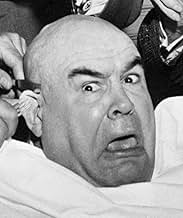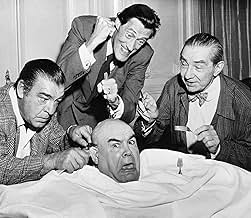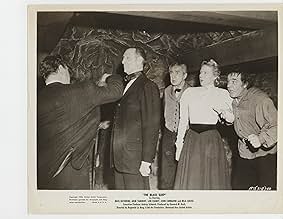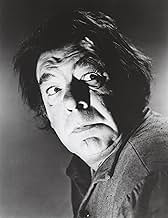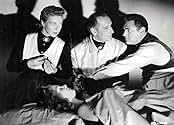IMDb RATING
6.0/10
2.2K
YOUR RATING
Sir Joel Cadman, a mad scientist, kidnaps his victims and cuts open their brains in an effort to discover a means to cure his wife's brain tumor.Sir Joel Cadman, a mad scientist, kidnaps his victims and cuts open their brains in an effort to discover a means to cure his wife's brain tumor.Sir Joel Cadman, a mad scientist, kidnaps his victims and cuts open their brains in an effort to discover a means to cure his wife's brain tumor.
- Director
- Writers
- Stars
Lon Chaney Jr.
- Mungo
- (as Lon Chaney)
Patricia Blair
- Laurie Monroe
- (as Patricia Blake)
Louanna Gardner
- Angelina Cadman
- (uncredited)
Peter Gordon
- Sgt. Steele
- (uncredited)
Clive Morgan
- Roundsman Blevins
- (uncredited)
Aubrey Schenck
- Prison Coroner's Clerk
- (uncredited)
John Sheffield
- Det. Redford
- (uncredited)
- Director
- Writers
- All cast & crew
- Production, box office & more at IMDbPro
Featured reviews
Sir Joel Cadman (Basil Rathbone), a mad scientist, kidnaps his victims and cuts open their brains in an effort to discover a means to cure his wife's brain tumor.
Okay, so you have a 1950s mad scientist story about a guy doing experimental brain surgery that results in some serious mistakes. That alone could probably make a pretty decent horror film -- who is opposed to seeing brain dead lobotomy patients lumbering through a dungeon?
But, really, this film could not have failed if it tried. Besides Rathbone, it features Bela Lugosi, Lon Chaney and John Carradine. They could have stood around and played hackey sack and I would still watch it.
Paul Corupe makes an interesting observation about this film's role in history. He notes that on the surface, Cadman is your typical 1930s mad scientist, saying things like, "In the interests of science, anything is justified." But underneath that, he is a 1950s scientist, a transitional figure who does experiments not just because he can but because he is trying to save a life -- he is one of the very first mad scientists we can feel sorry for, possibly. The only earlier example Corupe offers is from "The Ape" (1940).
Okay, so you have a 1950s mad scientist story about a guy doing experimental brain surgery that results in some serious mistakes. That alone could probably make a pretty decent horror film -- who is opposed to seeing brain dead lobotomy patients lumbering through a dungeon?
But, really, this film could not have failed if it tried. Besides Rathbone, it features Bela Lugosi, Lon Chaney and John Carradine. They could have stood around and played hackey sack and I would still watch it.
Paul Corupe makes an interesting observation about this film's role in history. He notes that on the surface, Cadman is your typical 1930s mad scientist, saying things like, "In the interests of science, anything is justified." But underneath that, he is a 1950s scientist, a transitional figure who does experiments not just because he can but because he is trying to save a life -- he is one of the very first mad scientists we can feel sorry for, possibly. The only earlier example Corupe offers is from "The Ape" (1940).
Oddly enough The Black Sleep was some years ahead of its time medically speaking. The title refers to a drug from India that scientists Basil Rathbone uses to do that. Today it's a technique to enable recovery from certain illnesses or injuries. But being that this is Basil Rathbone mad scientist you know the drug will be used for all kinds of nefarious purposes.
Rathbone gets Dr. Herbert Rudley out of prison to assist him by use of his coma inducing Black Sleep. Rudley is in prison for a murder he didn't commit. When he 'dies' before the death sentence is carried out that's the end of it. But Rathbone has a lot of work for Rudley to do, operations on some willing and not so willing patients. What it's all about you have to see The Black Sleep for.
If you do see it you're in for a treat because with a cast of scene stealing actors such as Bela Lugosi, Lon Chaney, Jr., and John Carradine, this is not to be missed. All three of their characters are products of Rathbone's failed experiments. Carradine in particular is joy. He plays a deranged man who thinks he's a Crusader King and he's overacting outrageously and I'm loving every minute of it. Also in the film is Akim Tamiroff as a gypsy grave robber who also aids Rathbone.
All these people have legions of fans still. So if you want to see a film that's a combination of Frankenstein and the Island of Dr. Moreau with a great cast you can't miss with The Black Sleep.
Rathbone gets Dr. Herbert Rudley out of prison to assist him by use of his coma inducing Black Sleep. Rudley is in prison for a murder he didn't commit. When he 'dies' before the death sentence is carried out that's the end of it. But Rathbone has a lot of work for Rudley to do, operations on some willing and not so willing patients. What it's all about you have to see The Black Sleep for.
If you do see it you're in for a treat because with a cast of scene stealing actors such as Bela Lugosi, Lon Chaney, Jr., and John Carradine, this is not to be missed. All three of their characters are products of Rathbone's failed experiments. Carradine in particular is joy. He plays a deranged man who thinks he's a Crusader King and he's overacting outrageously and I'm loving every minute of it. Also in the film is Akim Tamiroff as a gypsy grave robber who also aids Rathbone.
All these people have legions of fans still. So if you want to see a film that's a combination of Frankenstein and the Island of Dr. Moreau with a great cast you can't miss with The Black Sleep.
There is a good deal of talking in this movie, which probably puts a lot of people off. It's also not as cut and dry as most movies, the "bad" guy makes a good case for his experiments, he's just too passionate about them. There's an uneasy sense of dread here; the smell of death sulks in every black and white frame. Some viewers might be bored, confused, disturbed by the morbidity of it all.
But hang on to your straight jacket kids! The climax of this opus is completely deranged! It comes out of nowhere, it's incredibly disturbing and ends all too soon! Loonies! Religious nuts! Mutants! Dungeons! Exposed brain matter! A refreshingly intelligent premise and a nutso finale. My kind of movie.
Good luck finding it though.
But hang on to your straight jacket kids! The climax of this opus is completely deranged! It comes out of nowhere, it's incredibly disturbing and ends all too soon! Loonies! Religious nuts! Mutants! Dungeons! Exposed brain matter! A refreshingly intelligent premise and a nutso finale. My kind of movie.
Good luck finding it though.
The Black Sleep (1956)
This is one of those campy horror movies, two decades after the great originators, that fans will really love and newbies or outsiders will have trouble getting.
I'm mostly a fan, but even as the titles rolled and I couldn't believe the great cast, I was aware that this was 1956, that Bela Lugosi and Lon Chaney Jr. were well past their prime. And the lead, Basil Rathbone, was playing an evil doctor (a shade like Dr. Frankenstein, pushing moral boundaries with his surgery), was more known as Sherlock Holmes. Still, along with John Carradine, what a cast!
And this is really Lugosi's last uncompromised appearance in any movie, even though he plays a mute and we don't get to hear him. ("Plan 9" comes after this, but Lugosi's role there is famously limited.) He's terrific! And Chaney's appearance is also mute, a brief each time, and not such a big deal. (Once there is nice, corny subjective p.o.v. camera as he attacks his prey.)
The plot? The title? Well, it's all a bit obvious what's happening, though the opening twenty minutes is more a straight drama that actually suggests a really good movie is ahead. A man is on death row, and Rathbone visits him and gives him the Black Sleep potion, which puts him into a fake death and he is carted away and revived. That doesn't give too much away. For the rest of the movie the potion is really just used as anesthesia at the crazy doctor's castle and is no big deal.
There is the pretty girl in a coma, a misunderstood nursing assistant who is daughter of the Chaney character, another nurse who is oddly cold and efficient (and not a Nazi--this is all 1872), and then there is the main character, the man from death row, who happens to be a crack surgeon that the evil doctor needs for his research.
For the middle half of the movie you see minor tensions and some brain surgery that is meant to seem cutting edge and unscrupulous. Then, in a huge surprise, almost as if the director woke up, a bunch of old patients appear out of nowhere (maybe they escaped their cells). And it's a bit of absolute mayhem, with Carradine playing an angry Moses type, and it's pretty crazy.
Look, I said too much perhaps but you should know this isn't a great movie. But it's great camp. It's silly, it's filled with icons from the old days, and it's not so badly made at all, edited well and filmed better than you would think for this nadir of Hollywood productions. This is around the time of the new Castle low budget films, and early Corman stuff, but this one is clearly from the old school of 1930s Hollywood. See it on those terms and like it!
This is one of those campy horror movies, two decades after the great originators, that fans will really love and newbies or outsiders will have trouble getting.
I'm mostly a fan, but even as the titles rolled and I couldn't believe the great cast, I was aware that this was 1956, that Bela Lugosi and Lon Chaney Jr. were well past their prime. And the lead, Basil Rathbone, was playing an evil doctor (a shade like Dr. Frankenstein, pushing moral boundaries with his surgery), was more known as Sherlock Holmes. Still, along with John Carradine, what a cast!
And this is really Lugosi's last uncompromised appearance in any movie, even though he plays a mute and we don't get to hear him. ("Plan 9" comes after this, but Lugosi's role there is famously limited.) He's terrific! And Chaney's appearance is also mute, a brief each time, and not such a big deal. (Once there is nice, corny subjective p.o.v. camera as he attacks his prey.)
The plot? The title? Well, it's all a bit obvious what's happening, though the opening twenty minutes is more a straight drama that actually suggests a really good movie is ahead. A man is on death row, and Rathbone visits him and gives him the Black Sleep potion, which puts him into a fake death and he is carted away and revived. That doesn't give too much away. For the rest of the movie the potion is really just used as anesthesia at the crazy doctor's castle and is no big deal.
There is the pretty girl in a coma, a misunderstood nursing assistant who is daughter of the Chaney character, another nurse who is oddly cold and efficient (and not a Nazi--this is all 1872), and then there is the main character, the man from death row, who happens to be a crack surgeon that the evil doctor needs for his research.
For the middle half of the movie you see minor tensions and some brain surgery that is meant to seem cutting edge and unscrupulous. Then, in a huge surprise, almost as if the director woke up, a bunch of old patients appear out of nowhere (maybe they escaped their cells). And it's a bit of absolute mayhem, with Carradine playing an angry Moses type, and it's pretty crazy.
Look, I said too much perhaps but you should know this isn't a great movie. But it's great camp. It's silly, it's filled with icons from the old days, and it's not so badly made at all, edited well and filmed better than you would think for this nadir of Hollywood productions. This is around the time of the new Castle low budget films, and early Corman stuff, but this one is clearly from the old school of 1930s Hollywood. See it on those terms and like it!
If I went for snark more often in my reviews, I might say that "The Black Sleep" will put *you* into a black sleep. But, in truth, it's not *that* bad. It's just somewhat disappointing, given the gathering of some of the shining lights of the horror genre. This is really more of a period drama (with precious little period recreation - this is mostly shot in interiors) with touches of horror. Its first three quarters are somewhat dull, and talky, and most unfortunate of all, NOT very atmospheric.
The story mostly centers around the activities of a deranged doctor, Sir Joel Cadman (Basil Rathbone) who saves a former student, Gordon Ramsey (!) (Herbert Rudley) from the hangman. This he does with the assistance of a drug, the "Black Sleep" of the title, that can make people appear to be dead. Sir Joel intends to have Ramsey assist him in his radical research into the human brain. Ramsey meets such characters as Daphne (Phyllis Stanley), Sir Joels' loyal nurse, two mutes (Lon Chaney Jr. and Bela Lugosi), and the very fetching young Laurie Monroe (Patricia Blair), while an annoying, talkative gypsy named Odo (Akim Tamiroff) provides Sir Joel with unwilling test subjects.
"The Black Sleep" is saved, to a degree, by its final quarter, which is good fun, as more characters come crawling out of the woodwork. Among them is a hirsute John Carradine. Don't be fooled; despite his prominent billing, his is little more than a cameo role. The same goes for the hulking Swedish wrestler Tor Johnson, who doesn't show up for a long time. The reasonably likable Rudley does a decent job of carrying the story. He's a good man who claims to be innocent of a murder charge, and there's no reason to doubt him. He's also the moral centre, scoffing at the insanity perpetrated by Sir Joel. Mr. Rathbone is marvelous; his performance does ultimately transcend the material. But performers like Carradine, Lugosi, and Chaney end up rather under utilized.
Directed without much style by Reginald Le Borg ("Weird Woman", "Diary of a Madman"), but the score by the talented Les Baxter is definitely worth a listen.
Six out of 10.
The story mostly centers around the activities of a deranged doctor, Sir Joel Cadman (Basil Rathbone) who saves a former student, Gordon Ramsey (!) (Herbert Rudley) from the hangman. This he does with the assistance of a drug, the "Black Sleep" of the title, that can make people appear to be dead. Sir Joel intends to have Ramsey assist him in his radical research into the human brain. Ramsey meets such characters as Daphne (Phyllis Stanley), Sir Joels' loyal nurse, two mutes (Lon Chaney Jr. and Bela Lugosi), and the very fetching young Laurie Monroe (Patricia Blair), while an annoying, talkative gypsy named Odo (Akim Tamiroff) provides Sir Joel with unwilling test subjects.
"The Black Sleep" is saved, to a degree, by its final quarter, which is good fun, as more characters come crawling out of the woodwork. Among them is a hirsute John Carradine. Don't be fooled; despite his prominent billing, his is little more than a cameo role. The same goes for the hulking Swedish wrestler Tor Johnson, who doesn't show up for a long time. The reasonably likable Rudley does a decent job of carrying the story. He's a good man who claims to be innocent of a murder charge, and there's no reason to doubt him. He's also the moral centre, scoffing at the insanity perpetrated by Sir Joel. Mr. Rathbone is marvelous; his performance does ultimately transcend the material. But performers like Carradine, Lugosi, and Chaney end up rather under utilized.
Directed without much style by Reginald Le Borg ("Weird Woman", "Diary of a Madman"), but the score by the talented Les Baxter is definitely worth a listen.
Six out of 10.
Did you know
- TriviaShot February 9-23 1956, and the last completed film project of actor Bela Lugosi.
- GoofsWhen the evil doctor's last victim is uncovered, her facial muscles react visibly just before they pronounce her dead.
- Quotes
Sir Joel Cadman: Rome wasn't built in a day, so it must have been built in the night.
- ConnectionsFeatured in Weirdo with Wadman: The Black Sleep (1964)
- How long is The Black Sleep?Powered by Alexa
Details
Box office
- Budget
- $225,000 (estimated)
- Runtime
- 1h 22m(82 min)
- Color
Contribute to this page
Suggest an edit or add missing content


